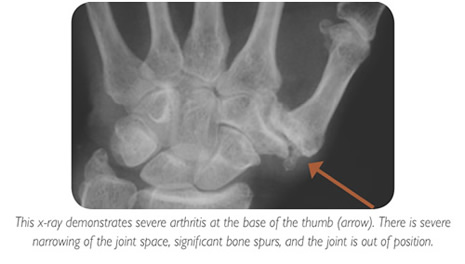|
Understanding Thumb Carpometacarpal ArthritisJohn Berschback, MD What is thumb carpometacarpal arthritis?Thumb carpometacarpal arthritis, also called basilar joint arthritis, is arthritis that occurs at the base of your thumb. The bones of the thumb are covered with a smooth cartilage that can wear away over time with normal use of the hand. The joint at the base of the thumb is called a “saddle joint” and is important for helping the thumb twist, turn and swivel. This condition is about 10 times more common in females than males and usually occurs in patients over 40 years of age.
What are the symptoms?Patients will typically complain of pain and swelling at the base of the thumb. There is frequently pain when performing activities such as turning a key or opening a jar. The joint may appear out of place or have a bony bump overlying it, and there is sometimes loss of motion. An injury to the thumb may be reported, but usually there has been no specific trauma. Most symptoms develop slowly and gradually worsen over time. It is also common for patients with thumb arthritis to have symptoms of carpal tunnel syndrome as well, such as numbness and tingling of the fingers. How is carpometacarpal arthritis diagnosed?This condition is diagnosed based on the history, physical exam and plain x-rays. Your doctor will distinguish this condition from others that may have similar symptoms, such as tendon inflammation near the base of the thumb. The grind test involves rubbing the ends of the bone together in an attempt to elicit pain, and can be used to help make the correct diagnosis. The x-rays usually show signs of arthritis, including bone spurs and narrowing of the joint space (see photo). An MRI or CAT scan is not needed as part of the work-up. What are the non-surgical treatment options?As with other types of arthritis, conservative measures are tried initially. Anti-inflammatory medication, such as ibuprofen, Motrin or Aleve may be prescribed or can be purchased at a local pharmacy. These should be taken with food to help avoid upsetting your stomach, and should be avoided if you have kidney or liver problems. Your doctor may recommend a special type of splint that can be worn to help immobilize the arthritic thumb joint. A steroid injection may also be tried. While steroids do not reverse the arthritis, they sometimes can provide long term relief and can be a good option if patients wish to avoid surgery. What are the surgical options?There are several different surgical options should you continue to have pain and symptoms after attempting non-surgical treatments. Probably the most common surgical procedure is to remove one of the bones involved in the arthritis process, called the trapezium.
A tendon from your forearm or wrist is then used to reconstruct the ligaments of the thumb joint, and can also be used to fill the space left by the bone that was removed. The surgery takes about one hour and can be done as an outpatient procedure. A third option that may be considered is to fuse the joint together, typically using a plate and screws. This option is sometimes considered in patients who are heavy laborers and use their hands for heavy lifting. While the results of this procedure compare well to the first procedure listed above, there are complications such as hardware problems and failure of the bones to fuse together. SummaryThumb carpometacarpal arthritis is a condition often treated by hand surgeons. Symptoms usually begin slowly and worsen over time, and can include problems with twisting and pinching objects. If non-surgical measures fail to provide relief, most patients will get good pain relief from one of several different surgical options.
Dr. John Berschback –Chippewa Valley Orthopedics & Sports Medicine |



